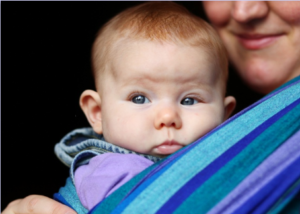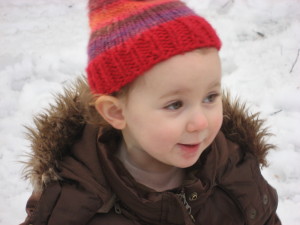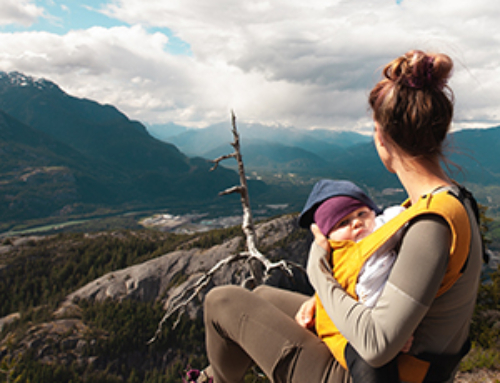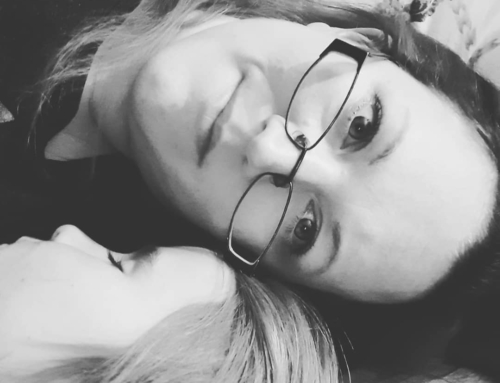Lately there seem to be many parents yelling about how much they hate our current generation of entitled children or young adults who can’t function on their own and don’t take responsibility for their actions. They seem to argue that it’s parents who are responsive that are a problem, something I’ve heard first hand (because didn’t you know that letting my child breastfeed at 2 means she’ll be a spoiled, rotten brat??). They often push for things like bullying being okay or leaving your child to cry because the real world is harsh: The problem is that we just haven’t been harsh enough with our kids and that’s why they can’t cope. I think it’s bullshit. You want to raise responsible adults? Here are six things you should allow your child to do if you want them to grow into adults who understand responsibility, will work hard, and be self-motivated…
 Allow your baby to be totally dependent on you. Our society focuses far too much on trying to make babies independent but quite simply, it won’t work. Think of your child as a house or tree, without the right foundation or roots, you will have problems. Attachment is absolutely necessary to children’s well-being. Although historical or evolutionary practices are very easy ways to get this attachment (because of the constant proximity between baby and a caregiver – typically mom but certainly not always given the high prevalence of alloparenting in these societies), as I’ve written about before it’s really all about responsiveness. Whereas leaving your baby to cry or refusing to feed or comfort at certain points is non-responsive, you simply cannot spoil a baby with too much love and you will not create “bad habits” or “clingy children” by responding to them. You just won’t. In fact, you’ll raise children who feel secure enough to go out and explore the world on their own, knowing they have a safe place to return to if necessary.
Allow your baby to be totally dependent on you. Our society focuses far too much on trying to make babies independent but quite simply, it won’t work. Think of your child as a house or tree, without the right foundation or roots, you will have problems. Attachment is absolutely necessary to children’s well-being. Although historical or evolutionary practices are very easy ways to get this attachment (because of the constant proximity between baby and a caregiver – typically mom but certainly not always given the high prevalence of alloparenting in these societies), as I’ve written about before it’s really all about responsiveness. Whereas leaving your baby to cry or refusing to feed or comfort at certain points is non-responsive, you simply cannot spoil a baby with too much love and you will not create “bad habits” or “clingy children” by responding to them. You just won’t. In fact, you’ll raise children who feel secure enough to go out and explore the world on their own, knowing they have a safe place to return to if necessary.
Allow your child to grow into his/her independence. You see, we have it backwards. We force independence in babies and then restrict it as our children develop and are yearning for independence. Does this mean we hand our 2 year old a knife and wish them luck? No, it means that we allow them to explore. In the younger years, it may be as simple as just letting them climb on the play structure themselves. In the older years, it’ll be letting them go on bike rides or walks to friends’ houses by themselves. You can always make sure your child is doing something as safely as possible but if you remove the chances for them to practice their independence out of fear of anything happening, you will stunt them.
If they have the secure foundation of responsive parenting in their early years, they know they can come to you if they run into problems and they most likely will. They may face problems that you wish they didn’t, but you’ll be there to see them through it, from cuts and broken bones to broken hearts and lost dreams. Remember that each child will grow into their independence in their own time – you can’t actually force independence. You can force independent-like behaviour, but if a child isn’t ready, it will be done with extreme anxiety which is not good for future exploration. (Also remember that a child who is set on being independent will find ways and if you make it too difficult for them, expect them to start doing it behind your back and probably not in the safest or sanest of ways.)
 Allow your child to play, and play rough (if she/he wants). Until the age of around 6 or 7, children should spend most of their time playing (and still a lot of time after that). Outdoors when possible, but at least playing. In our world of daycare and preschool and kindergarten readiness tests, we are so focused on trying to teach our children, I’m not sure that there’s any room for them to learn. Will they memorize things? Sure. But are they learning about their interests, the world around them, and how to engage with it? I don’t think so. Play is key to this process of learning and we need to allow them to cultivate it far more than we currently do.
Allow your child to play, and play rough (if she/he wants). Until the age of around 6 or 7, children should spend most of their time playing (and still a lot of time after that). Outdoors when possible, but at least playing. In our world of daycare and preschool and kindergarten readiness tests, we are so focused on trying to teach our children, I’m not sure that there’s any room for them to learn. Will they memorize things? Sure. But are they learning about their interests, the world around them, and how to engage with it? I don’t think so. Play is key to this process of learning and we need to allow them to cultivate it far more than we currently do.
One more thing, many kids (yes, girls included) will want to play rough – toy swords, toy knives, wrestling – and we should let them. Every bit of play is learning, including roughhousing, and from it they can learn a lot about safety, respect for others, and the appropriate ways to use tools. I know many people panic when their child shows an interest in rough play, especially those that identify as “gentle parents”. Remember: Gentle parenting is not about restricting play to gentle play, it’s about how you respond as a parent to your child.
Allow your child to take responsibility for his/her actions. There are two different problems in our society in this realm. Either parents, in an effort to avoid seeing their child in pain or suffering any type of punishment, cover for them or they offer harsh punishments that don’t fit “the crime”. In more traditional societies where groups are small and people have to work together, it is common for people to know how to make amends and if they don’t, allow the group or the elder to decide what actions should be taken while all accept the outcome to move forward. As we don’t have such small groups, we’re not used to that type of awareness of how our actions influence or affect other people, thus parents are used to either doling out punishments or hiding their child from responsibility.
What does taking responsibility look like? Well, at the basic level it’s letting your child take part in figuring out how to make amends if they’ve hurt someone, fix something they’ve done “wrong”, own up to any behaviour that hurt someone, or accept the natural consequences of their own behaviours. It’s bringing them into the fold and having them come up with solutions with you (to help guide them, but not tell them what to do). You should also be giving them things to be responsible for, whether it be a chore in the house, cleaning up after themselves, or being in charge of whatever toys they bring out in public. If they don’t have ways to practice responsibility, they can never learn it. Children as young as 2 or 3 can help come up with ideas and the more they do, the better they get at it and the more they learn to be responsible for themselves.
Allowing responsibility does not mean never helping them when they ask for it out of fear that they will not learn to be responsible. You also want to teach them to help others if they can and when the request is reasonable, so be prepared to do the same for them. It does not mean covering for them or fixing their problems without their input and work or helping when the request is not reasonable.
Allow your child to say “no”. If you were to actually step back for a day and observe your interactions with your child, how often do you think you’d allow them to say “no” to you? How often do you allow yourself to say “no” to them? It’s inherently going to be unequal, but in our society it is so skewed that we might as well be honest that we seem to have the primary goal of obedience, not raising children to think for themselves. Sometimes allowing them to do what they want will lead to failure for them (something I know we hate seeing) and that’s okay. They need to fail. We all do. With failure we learn: We learn what doesn’t work and we learn we need to change our plan if we want to reach our goal.
We also need to allow them to say no to develop their own voice. If they can’t feel safe saying “no” to a parent and having it be respected at least once in a while, how can we expect them to feel confident saying it to someone else? We worry about our kids running off with the wrong “crowd”, doing drugs or drinking too much, saying “yes” to sex when they aren’t feeling truly ready themselves. Although these behaviours stem from a multitude of issues, part of it comes down to kids who just don’t believe their “no” has a voice. It’s up to us as parents to give that “no” a voice.
One last thought on it: how can we expect them to respect our “no” when we don’t respect theirs?
Allow your child to be a child out in public. I have to qualify this by being clear that I’m not talking about all places, as there are areas where we need to be aware of how we all act and kids need to learn that too; however, we seem to look askew at anyone with a child who is being a child anywhere. Folks, public is public and it’s for everyone, children included. I don’t like the behaviours of many of the adults around me, but I acknowledge their right to behave that way in these spaces. My child has the same rights to behave like a child (arguably more because they don’t have the neurological capacity to always behave as others’ might like). That may mean being a bit too loud, running around, squealing with delight, and yes, sometimes breaking down. These are all normal behaviours. It’s how we handle things when they go too far that we must be aware of.
A child who is screaming at the top of her lungs should be reminded that it hurts other people’s ears and to be quieter or to find a place where that won’t bother people. Running around and crashing into people without regard is also something children need to learn not to do. And breaking down often requires gently removing a child from the situation until he or she is calm and figuring out what happened while offering comfort and understanding. Adults in our society need to be exposed to children as children are. Children need the exposure to public places and adults to learn how to behave, while also being allowed to be themselves in a respectful way. When we hide them from it or force them to behave in ways that aren’t aligned with their developmental level, we are making it harder and harder for them to learn to consider others (because they’re too focused on their own behaviour) or to take responsibility and learn about thinking of others. It also tells them that they are not worthy of respect (but others are) and frankly that’s not a lesson that’s going to serve anyone well if we want them to grow up to feel confident and secure in themselves.
***
There we have it. Six things you can allow your child to do that will help them be responsible, independent, caring grown-ups. You don’t need to force them to toughen up or even force them to be independent because they’ll get there on their own. The problem isn’t that we haven’t been “harsh” enough, the problem is that we’ve been harsh when we should be gentle, permissive when we should encourage responsibility, and driven by fear to restrict our children’s growth into independent beings. Let’s end that.






Absolutely enjoyed this read. There needs to be balance between letting your child be a child and learning how to take responsibility. Thank you, great tips.
[…] now have some tea, a hearty cheesy pasta dinner and a great article to read before I break out the knitting. Liam is curled up on the floor playing “Vet” for some […]
As a Brit living in Denmark with my son and his Danish Dad, I am often asked about why we chose to live here rather than in Britain. I usually say it’s because I think (from what I have seen) that it’s a better environment for children and families here, but when asked to explain further I struggle to say specifically why. However, your piece above explains a lot of what I have perceived, but have been unable to verbalise as succinctly myself. In particular, the Danes let children be children in public, and they allow them to play, outside and roughly! They recognise that this develops children’s independence and they don’t shove them in a classroom and ask them to learn by rote when they are 4. I’m not saying everything is perfect here, but it suits and supports the way we want to parent. So thanks for your writing, as you can see it really struck a chord with me.
Hi , we were fortunate enough to spend a few years in Slagelse, during the building of the stoerbelt tunnel, we went over with 3 kids and came back with 4 aged 0-9yrs!! I would agree with all you say, and they are so content with kids around. I was surprised how much the kids go outside even in the hard of winter, just rug them up and out they go at bornhaven. but I have since seen the research,that confirms it produces less sickness, infact it is too much indoors play that is/can be, the problem.
Happy memories of our time in DK
Resonates well with https://lovevonbeautyvonlove.wordpress.com/2012/07/30/little-guys-big-guys/
I love, love, love this article. Great advice.
[…] A good article on Parenting- https://gku.flm.mybluehost.me/evolutionaryparenting.com/six-ways-to-allow-your-child-to-become-a-responsible-adult/ […]
[…] Raising Responsible Children Starts with the Parent-Child Relationship […]
Quite simply- brilliant writing and so true! Will be forwarding this to a lot of like minded people 🙂 thank you!
[…] | Evolutionaryparenting | Nov 7th […]
[…] (Original post at Evolutionary Parenting) […]
Loved the article…the one mistake I made when my boys were small was to be intimidated by rough play when it got to a certain degree. I had a family of girls growing up (yes some girls play this way but we didn’t) and it was new to me.
Very well written and I agree with raising children this way. however, I was raised in the 40’s by very rigid New Englanders and had almost no freedom of self. I felt I knew how I wanted to raise my own and read many books on child rearing. Only others can tell how well I succeeded, but I did not raise our children as my family raised me.
This is an excellent article on the responsibilities of today’s parent’s! As a “meme”, of 8 grand children, i totally agree with what is written here…after raising 3 children, who are now 32, 30, & 28 yrs old, i see them doing a lot better job, with raising their children than i EVER DID. If it hadn’t been for their father, and the help of other family support, including “church” family, no telling how they would have turned out! I am very proud of all three of my “favorites”! It has been said that it takes a village to raise a child, & that’s the truth! Praise the Lord for giving me the opportunity to be an influence on my grand children’s lives! 🙂
I love this! such food for thought. I loved the point about letting your child say no.
Also the last point is a little reassuring. i have a one year old who is spirited and just screams and squeals all the time, mostly with pleasure. i have no idea what to do about it but I do know i am in for a lot of dirty looks.
Just about anybody can write an article like this. But, giving examples of each situation, the dialogue, and possible responses or actions for each situation is the challenge.
I did provide some examples, but every child is so different that you run the risk of people trying to follow exact scripts instead of the situation and their child. But I never tried to claim no one else could write an article like this – I’m well aware that anyone can. Just few seem to have.
I was nodding my head yes the whole time I was reading this! My husband mentioned just the other day about letting kids be kids even in public (gasp!) as being a good thing to do as parents and I completely agree. It’s how kids learn about the world.
I don’t think that more examples or word for word dialogue would help make the points any more clear. Sometimes we have to learn the ideas and methods (if we didn’t learn them from our own upbringing) and make them our own.
So interesting to hear about people’s perspectives who have lived in other countries.
The last one is my favorite. I was at a walmart the other day and this little baby was squealing, I could tell it was happy because my daughter does the same thing, well the mother was trying to shove a pacifier in his mouth, telling him to shush and even said ‘oh shut up were in a store!’ And here I was, holding my little girl laughing as she squealed in delight over everything….Why not let your child be a child?
From Holland my comment. I think it’s a good article about the six points. I miss the re-thinking about why these developments are going on in the present world. I read about taking responsibility for your baby and your child. I wonder how young people will do this. All developments in society are focused to economic contribution. All people should work from morning to evening even when they become parents. In Holland young mothers do have 16 weeks of maternity leave. After this period the child gets his,her attendance in day care. From 07.00 AM up to 06.00 PM no responsibity can be given by parents but will be given by, hopefully well trained, people who might not share your way of thinking or living. So, as a paradigm shift, we get a kind of state socialism in the Western Countries where parents do not really contribute to education. This is also why we started talking about quality time for children instead of bringing quality to the education.
In my opinion parents should take responsibility for their life and for the lifes of their children by choosing for less time for their jobs and spending more time with their children. In this case responsibility works in 2 ways. For parents and in co-ordination with the parents for the children who can be raised with enough quality time and personal interest.
Elaine stole my thunder.
I’m iffy on the saying “no.” My step daughter is not allowed to tell me no when I instruct her to do something. She’s 4 right now, so it usually is about leaving somewhere she’s having fun. I instantly let her know she’s not allowed to tell me no, remind her that I gave her a heads up we’d be leaving, and ask again that she get her coat on. When it’s strict defiance and disrespectful behavior, absolutely not.
To be fair, I let her know about thirty minutes ahead of time and I ask if she’s ready to leave. When she says no at that time, I’ll say okay, we can hang out a little longer, but then we have to go because of -reason-. I don’t have a total ban on “no”, cause that’s pretty extreme, but I can’t fathom letting her or my due-April-first son to talk back without immediate, firm and clear instructruction otherwise.
Let’s be clear – it’s not that you *always* allow no, but often it’s so one-sided that families *never* allow it. Finding a balance, like you have, seems reasonable. I guess it’s allowing it more than we often do in our society 🙂
[…] • Six Ways to Allow Your Child to Become a Responsible Adult on Evolutionary Parenting […]
Beautiful article, so interesting. Tjanks for the tips
[…] by providing them with love, support, structure and boundaries that will help them develop into responsible adults who know how to care for themselves in both good times and bad ones. And whether it’s one […]